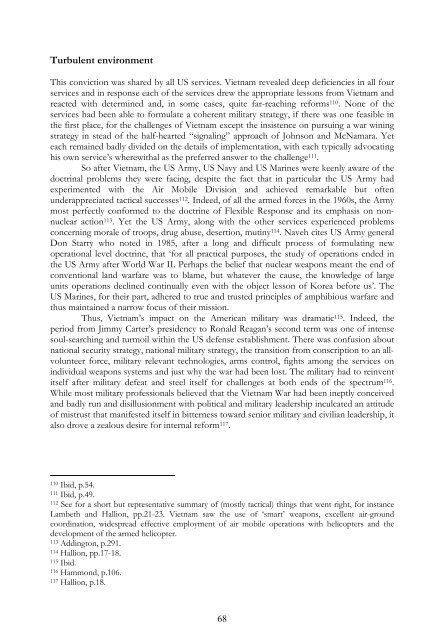Science, Strategy and War The Strategic Theory of ... - Boekje Pienter
Science, Strategy and War The Strategic Theory of ... - Boekje Pienter
Science, Strategy and War The Strategic Theory of ... - Boekje Pienter
You also want an ePaper? Increase the reach of your titles
YUMPU automatically turns print PDFs into web optimized ePapers that Google loves.
Turbulent environmentThis conviction was shared by all US services. Vietnam revealed deep deficiencies in all fourservices <strong>and</strong> in response each <strong>of</strong> the services drew the appropriate lessons from Vietnam <strong>and</strong>reacted with determined <strong>and</strong>, in some cases, quite far-reaching reforms 110 . None <strong>of</strong> theservices had been able to formulate a coherent military strategy, if there was one feasible inthe first place, for the challenges <strong>of</strong> Vietnam except the insistence on pursuing a war winingstrategy in stead <strong>of</strong> the half-hearted “signaling” approach <strong>of</strong> Johnson <strong>and</strong> McNamara. Yeteach remained badly divided on the details <strong>of</strong> implementation, with each typically advocatinghis own service’s wherewithal as the preferred answer to the challenge 111 .So after Vietnam, the US Army, US Navy <strong>and</strong> US Marines were keenly aware <strong>of</strong> thedoctrinal problems they were facing, despite the fact that in particular the US Army hadexperimented with the Air Mobile Division <strong>and</strong> achieved remarkable but <strong>of</strong>tenunderappreciated tactical successes 112 . Indeed, <strong>of</strong> all the armed forces in the 1960s, the Armymost perfectly conformed to the doctrine <strong>of</strong> Flexible Response <strong>and</strong> its emphasis on nonnuclearaction 113 . Yet the US Army, along with the other services experienced problemsconcerning morale <strong>of</strong> troops, drug abuse, desertion, mutiny 114 . Naveh cites US Army generalDon Starry who noted in 1985, after a long <strong>and</strong> difficult process <strong>of</strong> formulating newoperational level doctrine, that ‘for all practical purposes, the study <strong>of</strong> operations ended inthe US Army after World <strong>War</strong> II. Perhaps the belief that nuclear weapons meant the end <strong>of</strong>conventional l<strong>and</strong> warfare was to blame, but whatever the cause, the knowledge <strong>of</strong> largeunits operations declined continually even with the object lesson <strong>of</strong> Korea before us’. <strong>The</strong>US Marines, for their part, adhered to true <strong>and</strong> trusted principles <strong>of</strong> amphibious warfare <strong>and</strong>thus maintained a narrow focus <strong>of</strong> their mission.Thus, Vietnam’s impact on the American military was dramatic 115 . Indeed, theperiod from Jimmy Carter’s presidency to Ronald Reagan’s second term was one <strong>of</strong> intensesoul-searching <strong>and</strong> turmoil within the US defense establishment. <strong>The</strong>re was confusion aboutnational security strategy, national military strategy, the transition from conscription to an allvolunteerforce, military relevant technologies, arms control, fights among the services onindividual weapons systems <strong>and</strong> just why the war had been lost. <strong>The</strong> military had to reinventitself after military defeat <strong>and</strong> steel itself for challenges at both ends <strong>of</strong> the spectrum 116 .While most military pr<strong>of</strong>essionals believed that the Vietnam <strong>War</strong> had been ineptly conceived<strong>and</strong> badly run <strong>and</strong> disillusionment with political <strong>and</strong> military leadership inculcated an attitude<strong>of</strong> mistrust that manifested itself in bitterness toward senior military <strong>and</strong> civilian leadership, italso drove a zealous desire for internal reform 117 .110 Ibid, p.54.111 Ibid, p.49.112 See for a short but representative summary <strong>of</strong> (mostly tactical) things that went right, for instanceLambeth <strong>and</strong> Hallion, pp.21-23. Vietnam saw the use <strong>of</strong> ‘smart’ weapons, excellent air-groundcoordination, widespread effective employment <strong>of</strong> air mobile operations with helicopters <strong>and</strong> thedevelopment <strong>of</strong> the armed helicopter.113 Addington, p.291.114 Hallion, pp.17-18.115 Ibid.116 Hammond, p.106.117 Hallion, p.18.68
















